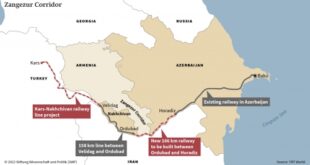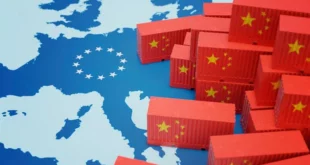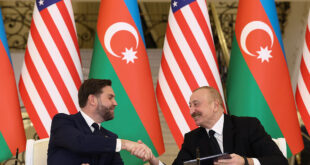 The battle for “ownership” of the polar oil reserves has accelerated with the disclosure that Russia has sent a fleet of nuclear-powered icebreakers into the Arctic, The Daily Telegraph reports.It has reinforced fears of Canada that Moscow intends to annex “unlawfully” a vast portion of the ice-covered Arctic, beneath which scientists believe up to 10 billion tons of gas and oil could be buried.
The battle for “ownership” of the polar oil reserves has accelerated with the disclosure that Russia has sent a fleet of nuclear-powered icebreakers into the Arctic, The Daily Telegraph reports.It has reinforced fears of Canada that Moscow intends to annex “unlawfully” a vast portion of the ice-covered Arctic, beneath which scientists believe up to 10 billion tons of gas and oil could be buried.
Â
Canada has already doubled its funding for works to study and map the Arctic seabed, in such a way as to reinforce their rights to these territories.
Russian ambition for control of the Arctic has provoked Canada to double (£20.5 million) its funding for work to map the Arctic seabed in support its claim over the territory.
Â
The Russian icebreakers have been patrolling huge areas of the frozen ocean for months in a row, cutting through ice up to 2.5m (8ft) thick.
Â
In turn, Canada also plans to open an army training centre for cold-weather fighting at Resolute Bay and a deep-water port on the northern tip of Baffin Island, both of which are close to the disputed region.
Â
The crisis has raised the spectre of Russia and the West joining in a new cold war over the Arctic unless the United Nations can resolve the dispute. Western countries consider Russian actions in the region as a provocation.
Â
US also lays a claim on its position in resolving the conflict in those territories.
Â
In April, Former director of the US Coast Guard Academy’s Institute for Leadership Scott G. Borgerson, suggested that Washington should begin from an agreement between the US and Canada on the legislative base for the Arctic as global warming opens up northern sea routes. He also called on American leaders to take the Canada’s sovereign requirements over the Northwest Passage seriously.
Â
“There are currently no clear rules governing this economically and strategically vital region”, says the article under the heading of “Arctic Meltdown: The Economic and Security Implications of Global Warming”, in which Borgerson’s argument gets summarized.
Â
“Unless Washington leads the way toward a multilateral diplomatic solution, the Arctic could descend into armed conflict”, American expert threatened
Â
Borgerson’s did not specify exactly which countries will descend into armed conflict, but stressed on the provocative actions by Russia, claiming the vast Arctic territories.
Â
“The situation is especially dangerous because there are currently no overarching political or legal structures that can provide for the orderly development of the region or mediate political disagreements over Arctic resources or sea-lanes. The Arctic has always been frozen; as ice turns to water, it is not clear which rules should apply. The rapid melt is also rekindling numerous interstate rivalries and attracting energy-hungry newcomers, such as China, to the region. The Arctic powers are fast approaching diplomatic gridlock, and that could eventually lead to the sort of armed brinkmanship that plagues other territories, such as the desolate but resource-rich Spratly Islands, where multiple states claim sovereignty but no clear picture of ownership exists”, he writes.
Â
Earlier High Representative for the Common Foreign and Security Policy of EU Javier Solana and Commissioner responsible for External Relations and European Neighbourhood Policy of EU Benita Ferrero-Waldner had said in their report that global warming will likely to lead to a dangerous confrontation between Russia and the West because of the Arctic’s enormous mineral wealth.
Â
Meanwhile, Russia pretends that it acts by using legitimate methods. “We do nothing on the spur of the moment or with the use of force”, Putin arrogantly declared before his departure from the Kremlin.
Kavkaz Center
 Eurasia Press & News
Eurasia Press & News



